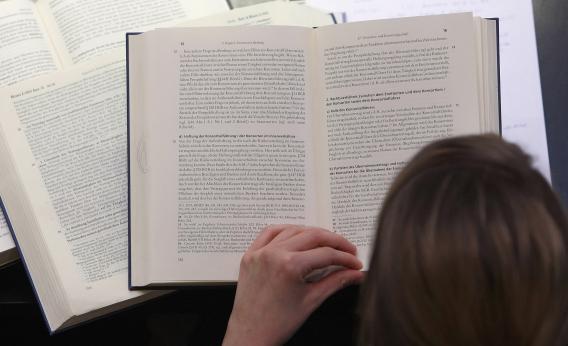Update, Thursday, Jan. 19, 11:15 a.m.: Apple’s foray into academic publishing is now official. Today, Apple will release iBooks 2, a new “textbook experience,” as a free app in the iTunes Store for use with an iPad. The first textbooks available will be for high-school students and will be priced at $14.99 or less. Textbook powerhouse publishers McGraw-Hill, Pearson PLC, and Houghton Mifflin Harcourt are taking part in the new venture. At the launch event this morning, the company also announced a new self-publishing system for authors.
Wednesday, Jan. 18: Could the days of used textbooks filled with misleading highlights be nearing an end?
Rumor has it that Apple is preparing to launch new e-book software. Ars Technica reports that Apple will hold an event about education technology tomorrow, and news outlets and blogs are speculating that the company intends to delve deeper into the realm of education by aiding the creation of interactive digital textbooks.
Before his death, Steve Jobs apparently decided to battle the multibillion-dollar textbook publishing industry, according to Bloomberg. The news service cites two anonymous sources that say Apple hopes push students and educators away from hard copies and toward iPads. Supposedly, the new software will allow individual authors to publish educational content as an iPad-friendly e-book, and Apple will work with publishers to digitize print textbooks.
Multiple publishers already produce interactive digital content, and part of Apple’s plan is to work with existing textbook powerhouses (even though Jobs reportedly hoped to vanquish them). Another target here is Amazon, which has its own publishing system for e-textbooks. The textbook turf war would be an extension of the iPad-Kindle Fire competition.
Apple is not the first to tackle the market of digital textbooks, but so far, previous attempts at creating a game-changing business model haven’t taken off.
As a college student myself, I’m skeptical of any company’s ability to revolutionize higher education, mainly because e-books aren’t yet more practical than the traditional bound text—and the transition will be particularly difficult for students paying their own way. If you’re weighed down by student loans and obscenely overpriced hard copy textbooks, purchasing an iPad is probably out of the question. And if not all students are able to purchase the tablet necessary for an Apple textbook, then a professor is not going to use such a book in class.
In August 2011, The Kojo Nnamdi Show covered the topic of e-books on campus. When the subject of cost surfaced, Eric Frank, co-founder of Flat World Knowledge, a publisher of free digital textbooks, said, “I think that’s what students have categorically rejected in the digital world more than anything, is they think the books are overpriced to pay 60 to 70 percent of what you’re paying for a print book. And then watch that book expire six months down the road and have a mediocre experience along the way.”
If Apple wants to make its venture work, perhaps the company should offer discounted tablets in addition to significantly marked down rental prices in order to make digital textbooks the more affordable option. Perhaps the company that made the MP3 market viable will also find the solution to the digital textbook conundrum.
